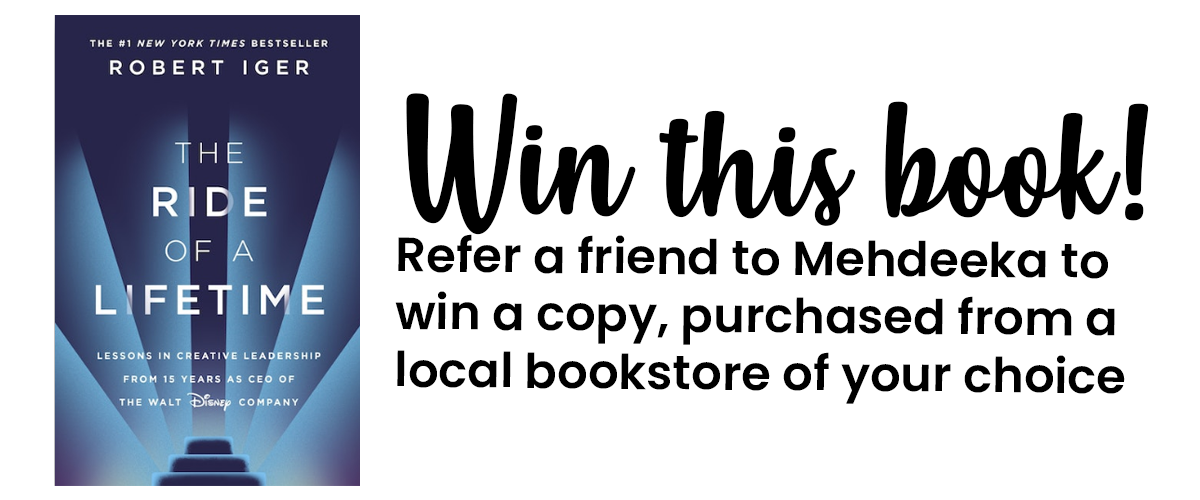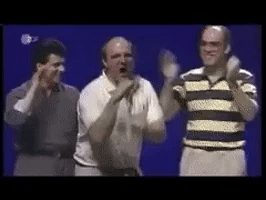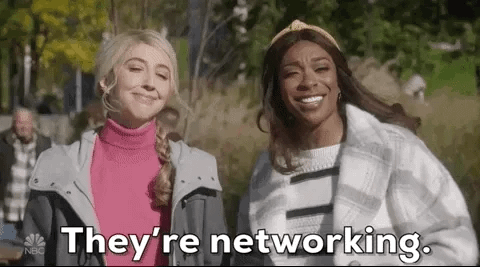📬 In this issue:
An interview with Bronwyn Cook, Head of Marketing APAC for Mastering SAP
When does it make sense to introduce events to your marketing mix (especially for small teams)
Event types, and which events to start with
How to measure the success of events
When to hire an agency to help out, or a full timer
This week’s Mehketeer referral thank you is Bob Iger’s Ride of a Lifetime. It’s my favourite* business book, and really somewhere between memoir and resume. To possibly get a copy, just use your referral link to send Mehdeeka to a friend or colleague before next week’s issue.
The recipient of last week’s tickets to the Generate Summit is Kate D! I’ll be in touch!
*For the record, I don’t think he should have gone back to Disney (and he even says in this book that leaders should know when to step away which is very ironic!)
Buongiorno Mehketeers,
If there’s one area of marketing I actively stay away from… it’s events. I’m just not a logistics type of person, and events are nothing but logistics. But alas, despite running away from it as fast as I can, it’s an important part of the marketing mix and dare I say trending in B2B lately?
I keep seeing way more emphasis on it, as well as it being a top answer whenever there’s a report about what marketers are focused on. Don’t ask me for sources, I couldn’t dig them up but I know it’s true because having this knowledge haunts me.
That’s why I reached out to Bronwyn Cook, who is often the first to jump in and answer questions about events in the Generate slack (ANZ marketers can join here!)
Bronwyn generously gave really in-depth answers, so you might want to open this in your browser instead of your inbox and grab a snack, or save it for later.
Here we go:
Kayla: For small teams, signing up for an event of any size can be a large task to take on, especially without a dedicated or experienced events person. How do you know if introducing events to your marketing mix will be worthwhile?
Bronwyn: Regardless of team size, events are an essential part of the B2B marketing mix. They offer the chance to build, grow and expand on personal relationships, which despite the B (business) in what we do, a computer does not make a purchasing decision, a person does.
Events play an even more crucial role the higher your average deal/sale size is. It would be pretty rare indeed for someone to make a high five / six figure purchasing decision without having met anyone from whom they were buying.
Events give you the chance to express your brands personality, make those 1:1 relationships, educate, inform and entertain your audience beyond the digital screen.
The decision to add events also depends on the maturity (and size) of your sales team and process, as they will be the ones responsible for following up the leads and moving them through the sales process. Discussing what type of events your sales team needs is of high importance.
Having a look at what events your competitors are doing is also a solid gauge of what events you should be participating in.
K: “Events” exist on a spectrum where the size, budget, and purpose can look really different. What are your top 3 event types for B2B brands? Would that list look different if you were comparing events for customers vs events for non-customers?
B: First thing to discuss is the different types of B2B events and align them to the marketing funnel. I know there is LOTS of discussion about the validity of the marketing funnel in todays highly digital environment and buying process, but sometimes it does remain a valid planning tool.
Awareness
Third party conventions, exhibitions, trade shows
Networking events
Webinars (thought leadership focused)
Consideration
Owned Conferences, roadshows
Workshops, seminars
Lunch and learns
Roundtables
Webinars (solution focused)
Decision
1:1 meetings
Executive/VIP breakfast, lunches, dinners
If I had to pick three to be in my marketing mix I would have:
Third party conventions, exhibitions, trade shows
Owned Conferences, roadshows
Executive/VIP breakfast, lunches, dinners
For customer v non-customer events, yes, this can make a difference. Customers already know you, so if upsell/cross-sell is your main focus, then I would be looking at: solution focused webinars, workshops, lunch and learns, roundtables and executive events.
Kayla note: can you believe this gif exists???
K: Events can be really overwhelming with all the moving parts, what advice would you have in terms of where to focus, and what not to worry about? What does an event “MVP” look like?
B: Where to focus = what is going to move the needle? What is going to have the most impact?
If I take my top three recommended events above, here are some of the questions I’d ask to build my MVP.
Third party conventions, exhibitions, trade shows
Without stating the obvious, is your target market going to be there? Insist on as much attendee demographic information from the event organiser as part of your event evaluation process.
As previously mentioned, are your or will your competitors be there?
These events come with a raft of sponsorship opportunities — all the way from headline keynote sponsor, to a booth presence. The key question to consider when looking at all options is - what data will you get? Will you get all the registration data? If you have a speaking session in a stream - will you get the data of the people that attend that session? Will you get only the data collected at your booth? Because, after building personal relationships, the next most important outcome from events is the DATA!
Owned Conferences, roadshows
Is your brand well known enough to potential attendees that would make them want to leave the comforts of their (home) office to attend?
Do you have a strong enough database (i.e. number of contacts) of potential attendees to justify an owned event?
Do you have enough content and speakers for an owned event, especially customer speakers? It’s very rare that someone would attend an event just to hear from your company, they want to hear from people using your product/solution.
Executive/VIP breakfast, lunches, dinners
Similar to the above, do you have a strong discussion theme? As lovely as a nice meal out is, attendees know they are going to hear some sort of relevant discussion — do you have that?
Events like these work well with a strong host or moderator. Do you have that internally or a relationship with an industry expert that would be willing to play that role?
Are your buyers receptive to this sort of event? For example, if you sell to the government, this could be considered a gift and government employees are not able to accept gifts of this nature.
K: How do you measure the success of an event, and what should you put in place before the event to make sure it’s measurable?
B: Like any marketing activity, a great framework to start with are SMART goals (specific, measurable, achievable, relevant, time-bound.)
These goals should be part of your decision framework on event investment. They should be discussed and agreed with your sales team, and are especially useful as part of the discussion that needs to happen every time sales ask “can we go to this event? Why aren’t we at this event?” (which most field marketers knows happens on a regular basis).
Return on Investment is also an important calculation. This is my preferred ROI calculation:
ROI = (Gross Return – Cost of Investment) ÷ Cost of Investment
The Gross Return is dependent on how you as a marketing team are measured. I’ll give an example based on previous experience, where marketing was measured on “marketing sourced opportunities”, and the target to reach was 5x opportunities valued at $200,000 each.
Therefore, the Gross Return = 100 MQLs > 5 opportunities worth an average of $200,000 = $1,000,000
To calculate the Cost of Investment (the event), add the sponsorship cost + any additional booth costs + travel + staff time on stand (the last two are often excluded). As an example, let's say $80,000.
ROI = ($1,000,000 - $80,000) ÷ $80,000 = 11.5:1 ROI. For every $1 invested, $11.5 is expected as a result.
Now, you are probably asking what’s a “good” ROI for B2B events. I’ve seen everything from 3:1 to 5:1 to 23:1 listed as good or average. I’ve worked on events on both ends of the scale.
Having a solid ROI calculation makes it easier to compare the different marketing channels as well.
Taking the three events I would have in my marketing mix, here’s how I would measure their success. How you measure it would change depending on your marketing and sales process.
Third party conventions, exhibitions, trade shows, and owned conferences, roadshows
Number of leads
Conversion at each stage from marketing generated lead > MQL > sales accepted lead (SAL) > sales qualified lead (SQL), and opportunity stages
Soft measures include increase in followers across social networks and increase in visitors to website
Executive/VIP breakfast, lunches, dinners
Sales qualified lead to opportunity
Progression of opportunity stages
Closed won/closed lost opportunities
K: When does it make sense to manage events in house as part of a team effort, hire a dedicated person (freelance or full time), or get an events agency?
B: Depends on your event mix.
If you are going to invest more on the third party side, then an agency or freelancer will be able to manage all the moving parts involved in these events for you (aside from the internal workings like finance etc).
If you are going to invest more in owned events, then a dedicated in-house team will ultimately provide the best long term investment. They can also build the internal relationships needed for owned events and manage the internal processes.
It’s also important to build excellent relationships with event suppliers - think AV, booth construction, promotional goods, printers, speaker bureaus. I’ve got a tried and true, trusted stable that I work with again and again and they are just as invested in my event success as I am.
Regardless, here are some of my top tips for B2B event marketing success:
Events are so much more than the day itself. Set yourself up for success by considering all pre, on the day, and post event activity. Pre and Post can often be a blind spot:
Pre: get all your measurements in place, do thorough briefings with the onsite team, make sure they understand their roles, responsibilities and expectations, get your post-event follow up activity agreed and in place before the event
Post: get that data into your CRM as soon as possible and activate your post-event activity. Think beyond a standard email - create a landing page just for that event that carries on your event messaging and has assets that attendees can self-nurture through (this can also be used as a CTA during the event), or perhaps send a quick follow up SMS (can highly recommend ClickSend as a platform)
No matter what type of event you are running - always ask yourself “how can I surprise and delight my attendees”. This can be as small as having a berocca station the morning after a drinks/dinner event, to as large as personalised gifts. You’d be surprised how the small things can make a big difference.
Have an event kit bag, in a carry on size suitcase with wheels.
Always have plans A, B, C, D, E…..
There is no such thing as too organised.
HAVE FUN. The last thing you want is to be easily forgotten. Learn from our mates in B2C marketing and bring sparkle and personality to events.
Register me up, Scotty
I want to once again just thank Bronwyn for how much information she’s packed into this issue! And as someone who’s not an events afficionado, I also want to acknowledge this is a packed issue and I don’t want to overload it.
I’ll leave you with a promise that this won’t be the only issue on events, and if you want to join me in upskilling in this area, then leave a comment and let me know what your questions (or fears, if you’re me) are!
Time for another snack,
Kayla








Great overview on events!
I still remember the nervous energy of running my first event. Glad it's not my day to day job now.